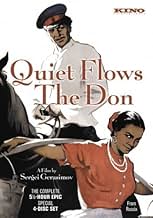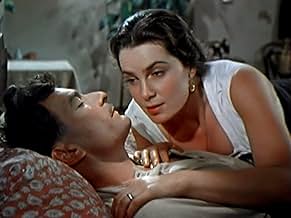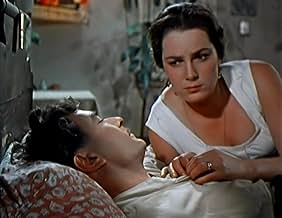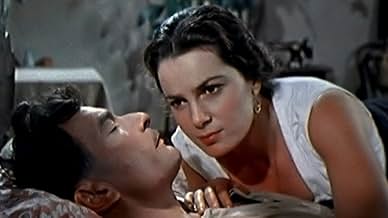AVALIAÇÃO DA IMDb
7,7/10
1,4 mil
SUA AVALIAÇÃO
Adicionar um enredo no seu idiomaAn epic story of shattered lives of the Don Cossacks through chaos of World War I, the Russian Revolution, and the following Civil War.An epic story of shattered lives of the Don Cossacks through chaos of World War I, the Russian Revolution, and the following Civil War.An epic story of shattered lives of the Don Cossacks through chaos of World War I, the Russian Revolution, and the following Civil War.
- Direção
- Roteiristas
- Artistas
- Prêmios
- 1 vitória no total
Daniil Ilchenko
- Panteleimon Prokofyevich Melekhov
- (as D. Ilchenko)
Anastasia Filippova
- Ilyinichna - maty
- (as A. Filippova)
Pyotr Glebov
- Grigoriy Melekhov
- (as P. Glebov)
Nikolai Smirnov
- Pyotr Melekhov
- (as N. Smirnov)
Lyudmila Khityaeva
- Dariya - zhena Melekhova
- (as L. Khityayeva)
Natalya Arkhangelskaya
- Dunyashka Melekhova
- (as N. Arkhangelskaya)
Aleksandr Blagovestov
- Stepan Lekatov
- (as A. Blagovestov)
Elina Bystritskaya
- Aksiniya
- (as E. Bystritskaya)
Aleksandr Zhukov
- Miron Koshevoy
- (as A. Zhukov)
Aleksandra Denisova
- Lukinichna
- (as A. Denisova)
Zinaida Kirienko
- Natalya Melekhova
- (as Z. Kiriyenko)
Boris Novikov
- Mitka Korshunov
- (as B. Novikov)
Aleksandr Karpov
- ded Grishaka
- (as A. Karpov)
Yelena Maksimova
- maty Koshevogo
- (as Ye. Maksimova)
Gennadi Karyakin
- Mikhail Koshevoy
- (as G. Karyakin)
Valentina Khmara
- Mashutka Koshevaya
- (as V. Khmara)
Pyotr Chernov
- Ilya Bunchuk
- (as P. Chernov)
- Direção
- Roteiristas
- Elenco e equipe completos
- Produção, bilheteria e muito mais no IMDbPro
Avaliações em destaque
I would highly recommend this film to anyone that is interested in Cossack history and culture and/or early Soviet history. However, if you don't already have an interest in these areas, you will likely find the films very slow and boring. All three parts take some patience to watch due to their length and pacing, especially the first part which really isn't all that exciting and is more of a soap opera as others have mentioned.
A couple bits of advice for the foreign/western viewer:
1. The first part may not be as exciting as the last two, but it introduces you to all the characters in the film and fleshes out their relations to each other. To get the most out of the parts 2 and 3, it is important to make an effort to put names to faces and note how each character is related to each other.
2. The films were made for audiences that already had some knowledge of Cossacks and this period in history (WWI, Russian revolution, and the civil war). There are scenes that take place in parts 2 and 3 that no background information is given on, and if you are not familiar with the history will be somewhat confusing. It is highly recommended that one do a little reading online on Cossack history during this period before viewing this miniseries. It would also help to have a basic understanding of Russian revolution and subsequent civil war.
A couple bits of advice for the foreign/western viewer:
1. The first part may not be as exciting as the last two, but it introduces you to all the characters in the film and fleshes out their relations to each other. To get the most out of the parts 2 and 3, it is important to make an effort to put names to faces and note how each character is related to each other.
2. The films were made for audiences that already had some knowledge of Cossacks and this period in history (WWI, Russian revolution, and the civil war). There are scenes that take place in parts 2 and 3 that no background information is given on, and if you are not familiar with the history will be somewhat confusing. It is highly recommended that one do a little reading online on Cossack history during this period before viewing this miniseries. It would also help to have a basic understanding of Russian revolution and subsequent civil war.
Beautiful film and well-acted in a theatrical style that is common of many older Russian films. The story is long and involved, and an American audience will likely wonder what the point of the first 1/3 of the movie is about. As described by another, that portion of the film seems very much like a soap opera concerned with who is sleeping with whom. More importantly is how the scandal plays out in the families and village and how the characters are trapped within their lives, culture, communities, and expectations.
Americans and other westerners might also be surprised by the 2nd part of the film, which depicts the Bolshevik victory as far from certain, often challenged, with parties changing sides and allegiances as the war weary citizens fight on through tragedy after tragedy.
Overall, it's a brilliant film ... a technical and cinematic achievement, for sure. Comparisons to "Gone with the Wind" are entirely appropriate .. however, it is a "Gone with the Wind" with muscles, with combat, with blood, with real tragedy.
Americans and other westerners might also be surprised by the 2nd part of the film, which depicts the Bolshevik victory as far from certain, often challenged, with parties changing sides and allegiances as the war weary citizens fight on through tragedy after tragedy.
Overall, it's a brilliant film ... a technical and cinematic achievement, for sure. Comparisons to "Gone with the Wind" are entirely appropriate .. however, it is a "Gone with the Wind" with muscles, with combat, with blood, with real tragedy.
Those Soviets surely were not holding back spending their rubles on large scale productions at the time. This over 6 hour long epic production is not just epic in its running time. It's an epic movie in basically all of its sequences and the movie gets filled with some impressive battle sequences as well. The Soviets were basically the pioneers in how large scale battles and battle sequences in general got brought to the screen. Another and even better example (and longer) of this is the even larger 1967 Soviet movie production of war and peace; "Voyna i mir".
The way I see this movie it's basically a tribute to the Cossacks. They get presented as a proud, noble and hard working community of farmers, who fight and give their lives for mother Russia in its most dyer times. The backbone of Russia so to speak. Hyme to the Cossacks could had been a title for this time.
Appearantly there also is a short version of this all somewhere available for the international market, which is a good thing. Although the story is always great, 6 hours is of course a long time to watch anything. I can also imaging an 2 hour movie telling exactly the same story and just as good. The movie perhaps repeat itself too often and all that at times seems to be happening are a bunch of characters sitting around either eating, drinking or being depressed.
But no, it's not like the movie ever turns into a weak one. It's far too well done for that, even when the movie is turning slow. Its story and characters always make sure that you'll stay interested throughout.
A real large scale cinematic accomplishment about love and war, in the early 20th century southern Russia countryside.
10/10
http://bobafett1138.blogspot.com/
The way I see this movie it's basically a tribute to the Cossacks. They get presented as a proud, noble and hard working community of farmers, who fight and give their lives for mother Russia in its most dyer times. The backbone of Russia so to speak. Hyme to the Cossacks could had been a title for this time.
Appearantly there also is a short version of this all somewhere available for the international market, which is a good thing. Although the story is always great, 6 hours is of course a long time to watch anything. I can also imaging an 2 hour movie telling exactly the same story and just as good. The movie perhaps repeat itself too often and all that at times seems to be happening are a bunch of characters sitting around either eating, drinking or being depressed.
But no, it's not like the movie ever turns into a weak one. It's far too well done for that, even when the movie is turning slow. Its story and characters always make sure that you'll stay interested throughout.
A real large scale cinematic accomplishment about love and war, in the early 20th century southern Russia countryside.
10/10
http://bobafett1138.blogspot.com/
The film contains 3 parts, each of which is close to 2 hours.
Here are what I like: 1. This film accurately depicted an agricultural society before the industrial revolution. People used oil lamps. Most people were not well educated. There was no sliced bread. You need to slice bread when you eat. People ate potato, bread, drank milk and soup. There were no in-door plumbing.
2. People's psyches were also very typical of a pre-industrial society. Everyone in the Cossack community were Orthodox Christian. The basic moral fiber was well and strong. Multi-generations lived in a large household. Young people were hooked up by marriage brokers. Young people needed family patriarch's blessing before they could marry.
In other words, you would feel people's psyches and the society at large were very much like the Chinese society before China felt the impact of industrial revolution.
I felt very familiar with the characters and their surroundings. In fact, I felt the men and women were so intimate to me, that I felt really strongly about their joy, anxiety, and anguish.
3. Politics was a central theme in this movie. The novel and the film did a great job in depicting the reality of Russia during the tumultuous years of War World I and the Civil War following the Boshevik revolution.
4. Watching the film, I hated the communists who pretended to be pacifists during War World I, and then showed their ugly face by pushing the country into a 3-year long extremely bloody civil war after War World I ended.
5. Overall, the protagonist, Grigory Melekhov, is a freedom loving, traditionalist with a humanist world view. The communists had the inhumane view of class warfare, and were power mongers.
6. It is amazing that the movie makers were able to make the movie without a single brush of communist propaganda. The movie didn't villanize either side. Nor did it promote, or aggrandize either side.
7. I didn't read the novel. It was said that the adaptation to film lost the richness of the novel. On the basis of the film, I'd say the story structure is a very good epic structure.
8. It is a very dramatic and moving story. With a lot of colorful characters, with rich and interesting characterizations.
9. The 4th DVD contains special features. There were an interview with Ellina Bystritskaya who played Aksinya and an interview with Zinaida Kirienko who played Natalya. Both interviews were done in 2002, I believe. They are quite interesting.
Here are what I felt could be better: 10. There is a soap opera feeling to the film. The characters are not very deep.
11. There were many drinking and eating scenes, which became repetitive.
12. The ending is not satisfactory. The novel was originally circulated in 1928, under Stalin's regime. It would have been banned in Soviet Union if it had a satisfactory ending to my taste. So, I really don't expect more.
13. All characters were quick at saying negative things, and none were good at saying positive things.
Here are what I like: 1. This film accurately depicted an agricultural society before the industrial revolution. People used oil lamps. Most people were not well educated. There was no sliced bread. You need to slice bread when you eat. People ate potato, bread, drank milk and soup. There were no in-door plumbing.
2. People's psyches were also very typical of a pre-industrial society. Everyone in the Cossack community were Orthodox Christian. The basic moral fiber was well and strong. Multi-generations lived in a large household. Young people were hooked up by marriage brokers. Young people needed family patriarch's blessing before they could marry.
In other words, you would feel people's psyches and the society at large were very much like the Chinese society before China felt the impact of industrial revolution.
I felt very familiar with the characters and their surroundings. In fact, I felt the men and women were so intimate to me, that I felt really strongly about their joy, anxiety, and anguish.
3. Politics was a central theme in this movie. The novel and the film did a great job in depicting the reality of Russia during the tumultuous years of War World I and the Civil War following the Boshevik revolution.
4. Watching the film, I hated the communists who pretended to be pacifists during War World I, and then showed their ugly face by pushing the country into a 3-year long extremely bloody civil war after War World I ended.
5. Overall, the protagonist, Grigory Melekhov, is a freedom loving, traditionalist with a humanist world view. The communists had the inhumane view of class warfare, and were power mongers.
6. It is amazing that the movie makers were able to make the movie without a single brush of communist propaganda. The movie didn't villanize either side. Nor did it promote, or aggrandize either side.
7. I didn't read the novel. It was said that the adaptation to film lost the richness of the novel. On the basis of the film, I'd say the story structure is a very good epic structure.
8. It is a very dramatic and moving story. With a lot of colorful characters, with rich and interesting characterizations.
9. The 4th DVD contains special features. There were an interview with Ellina Bystritskaya who played Aksinya and an interview with Zinaida Kirienko who played Natalya. Both interviews were done in 2002, I believe. They are quite interesting.
Here are what I felt could be better: 10. There is a soap opera feeling to the film. The characters are not very deep.
11. There were many drinking and eating scenes, which became repetitive.
12. The ending is not satisfactory. The novel was originally circulated in 1928, under Stalin's regime. It would have been banned in Soviet Union if it had a satisfactory ending to my taste. So, I really don't expect more.
13. All characters were quick at saying negative things, and none were good at saying positive things.
This is how old time well done propaganda was made, with emotion, with history, with characters wearing their hearts on the outside, with a story that binds the good and the bad in myriad ways, taking the viewer through all the mistakes one could think of doing in relationship with challenging the totalitarian party, and then learning how the "right ways".
The story feels real, even though, for myself, coming from a communist country, it is clearly plastic fantastic, but it represents the idealistic expectations of how to have the community behave in relationship to the party ideals.
All in all, one should watch it, immerse in it, but not lose the sight of a propaganda product. But very well done.
The story feels real, even though, for myself, coming from a communist country, it is clearly plastic fantastic, but it represents the idealistic expectations of how to have the community behave in relationship to the party ideals.
All in all, one should watch it, immerse in it, but not lose the sight of a propaganda product. But very well done.
Você sabia?
- CuriosidadesOriginal Russian film is 340 minutes long (film length 9,582 m). It was reduced to 107 minutes for international distribution.
- ConexõesFeatured in Zhizn odna... (1987)
Principais escolhas
Faça login para avaliar e ver a lista de recomendações personalizadas
- How long is Quiet Flows the Don?Fornecido pela Alexa
Detalhes
- Tempo de duração
- 5 h 30 min(330 min)
- Mixagem de som
- Proporção
- 1.37 : 1
Contribua para esta página
Sugerir uma alteração ou adicionar conteúdo ausente



























